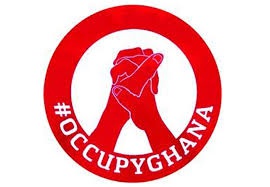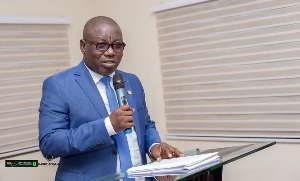Pressure group, Occupy Ghana has endorsed calls by the Commission on Human Rights and Administrative Justice (CHRAJ) to re-table the Conduct of Public Officers Bills in Parliament for passage.
The calls followed concerns raised by CHRAJ on the recent allegations of corruption, particularly bordering on procurement and conflict of interest breaches.
A statement by Occupy Ghana stated that there is a need for investigations to be carried out accompanied by stiff penalties when public officers are found to be involved in corrupt practices.
"The proposed Conduct of Public Officer’s Bill makes clear that conflicts and likely conflicts of interest are forbidden. Further, not only must a public officer facing a conflict declare that conflict to the institution concerned, but they must also declare it to CHRAJ or other prescribed body, and comply with any directions thereafter," part of the statement read.
According to the Activist group, “This can be achieved by government immediately bringing back to Parliament debate on the Conduct of Public Officers Bill, which has been sitting dormant since 2015”.
Below is a copy of the full statement
OccupyGhana® has noted, fully identifies with and wholeheartedly endorses the 2nd September 2019 call by the Commission on Human Rights and Administrative Justice (CHRAJ) for the enactment into law of the long-standing Conduct of Public Officers Bill. It would be recalled that we made the same call in our press statement dated 23rd August 2019 titled “OCCUPYGHANA® DEMANDS FIRM ACTION ON THE PUBLIC PROCUREMENT AUTHORITY AND COLLAPSE OF FINANCIAL INSTITUTIONS MATTERS,” where we also stated that “there is no justifiable or acceptable reason for the failure to pass that into law.” Tellingly, we added that “public office holders ought to know that there would be painful legal consequences for engaging in a conflict of interest and conflict of duty acts.”
It is almost ironic that within days, Ghana has had to deal with yet another ‘scandal’ involving allegations of conflict of interest concerning a Board Member at a major public institution. Without commenting on the facts of any particular case, these latest issues and the rapidity of them throw into stark relief the urgent and continuing need to enact legislation to enforce public officers to take seriously their duties as guardians of the public purse.
More fundamentally, there is a crying need for thorough investigations and stiff penalties where public officers are found to be placing themselves at potential conflict of interest. This can be achieved by government immediately bringing back to Parliament debate on the Conduct of Public Officers Bill, which has been sitting dormant since 2015.
OccupyGhana® has repeatedly discussed and brought up for discussion, the duties and roles of a Board and Board Members. That is because what is often apparently misunderstood is the utmost duty of good faith and bona fides that comes with serving in a fiduciary position, which is what Board Membership really means. A fiduciary relationship is essentially one of a trustee. It is a basic principle of a trust that a trustee cannot profit personally from the property to which they have been entrusted. A Board Member of a public institution must never place themselves in a position where they may be suspected of profiting (directly or indirectly, including through any company or property they own) from the institution’s funds. That is why Article 284 of the Constitution prohibits, not just actual or real conflicts of interest and duty but even the likelihood (possibility, potential, chance) of it.
That brings into question whether the normal requirements of full disclosure, non-participation in decisions and even full arm’s length transactions, which might pass muster under the common law, are sufficient to meet the constitutional standard in Ghana. If mere likelihood is prohibited, then it stands to reason that under no circumstances should any Board Member allow their company or property to be offered to the public institution for which they serve, whether for profit, personal benefit or otherwise. Thus, it would appear to us that a bid won by a public official’s company, concerning the institution for which they serve, is a tainted bid and brings into question the value for money of the bid concerned, and whether the bid was truly fair and competitive.
We are of the view that simply declaring an interest and not participating in the decisions are not enough to deal with suspicions over the use or abuse of insider information. Worse, declaring their interest could in fact heap substantial pressure on fellow Board Members and staff, especially significantly, on those in the entity who have to take procurement decisions. This can skew the playing field in one direction and would prevent other companies from entering the bidding process with any confidence that they can compete fairly and, on a level, playing field.
We believe that it is for this reason that the framers of the constitution prohibited both actual conflict and the “likelihood” of conflict. In our view, the proper course for a public officer facing a conflict of interest is to remove themselves and any company they own completely from pitches or offers of contracts with the institution concerned.
The proposed Conduct of Public Officer’s Bill makes clear that conflicts and likely conflicts of interest are forbidden. Further, not only must a public officer facing a conflict declare that conflict to the institution concerned, but they must also declare it to CHRAJ or other prescribed body, and comply with any directions thereafter.
OccupyGhana calls for any new Bill to go further and state in no uncertain terms that in any situation of a likely conflict of interest, the public officer must ensure that any bid for contracts or other interaction between their private company or property and the public institution be immediately withdrawn.
It is now imperative that firm measures are brought into law to restrict the excesses of certain public officials, and to provide a key deterrent against further abuse of public office. It will simply state what we accept or do not accept in Ghana. This must be combined with a campaign to educate Ghana’s public on this vexed and deeply misunderstood issue of conflicts of interest and duty.
Yours in the service of God and Country
OccupyGhana®
General News of Thursday, 5 September 2019
Source: www.ghanaweb.com
Occupyghana wants urgent government action on conflict of interest
 Pressure group, Occupy Ghana
Pressure group, Occupy Ghana












